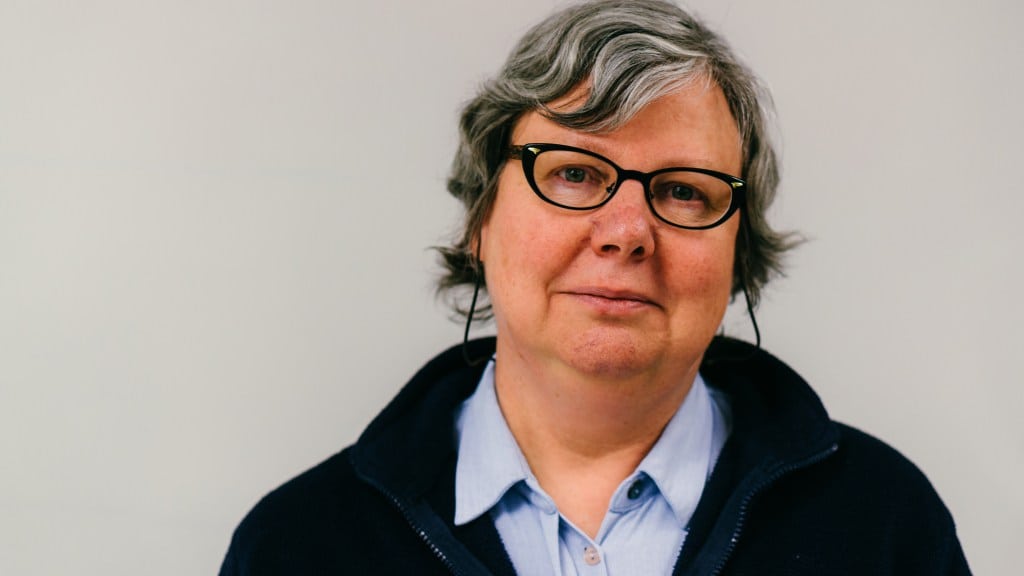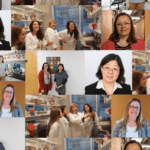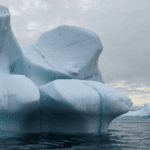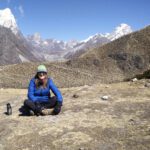Dr. Alwynne Beaudoin started off in a joint BSc in geology and geography program at the University of Leeds (UK), until she realized she was interested in natural history and landscape history – well, history as a whole, in fact. So she decided to focus on physical geography with a minor in geology. Upon completing her BSc, she had trouble finding funded postgraduate positions in the UK, which is when her tutor at Leeds suggested she keep her studies as a “hobby.” Fortunately, the comment only served to stiffen her resolve and look abroad for a position.

Image: Archaeological Society of Alberta – Calgary Centre
Beaudoin and her sister had always been encouraged by her parents, who shared their interest in science. “My father could have been an engineer, if life circumstances allowed,” she recalls. “Our house was filled with books and music, and we did a lot of outdoor activities like hiking and walking. We collected wild foods, and my parents had an allotment garden. We also visited National Trust sites, which is where the history came in.” In Beaudoin’s formative years, there was no separation between science and history – and that’s perhaps from where her interest in archaeology sprang.
Beaudoin arrived in Canada at the age of 21 with a backpack and £300 in her pocket. She completed an MSc and PhD in physical geography at the University of Western Ontario (UWO), then worked as a sessional instructor at UWO and Trent University for a couple of years before heading west to work for the Archaeological Survey of Alberta.
Now 28 years into her career and holding the position of Head Curator for the Earth Sciences Section (Quaternary environments, geology, and Quaternary palaeontology) at the Royal Alberta Museum, Beaudoin brings a love of art, music, and history to an engaging and multi-faceted position. “I’d say I have about five main roles in my current position,” she says, outlining a list that includes:
- Curatorial duties, including looking after the collection by labelling, tracking, storing, and caring for the many specimens and samples.
- Research, which includes the field- and lab work undertaken to obtain most of the collection, though some arrives by donation.
- A substantial interpretation and outreach component, including developing exhibitions and galleries, giving public lectures, publishing and engaging with other scientists, and more recently getting involved in social media.
- Interacting with other areas of the museum; for example, working with the education unit in developing new programs and sharing her knowledge with Museum School students.
- Interfacing with the provincial regulatory environment, especially educating the public on the scientific and heritage value of leaving things “in place.”
“We actually get a lot of public inquiries,” notes Beaudoin. “The public is really our eyes and ears on the landscape, and we engage them as advocates and partners in stewardship of historical resources. The neatest thing we saw recently was a 10,000-year-old bison skull, brought in by a person who’d found it while diving in Cold Lake. It’s highly unlikely we’d have found that through our own fieldwork program!”
Beaudoin has seen a lot change for women in science throughout her career. “There are far more women in science,” she notes, “especially in senior science positions. There’s also a lot less negativity, especially in field-based sciences. And it’s been a few years since I’ve heard anyone say ‘Oh, she only got that job because she was a woman.’” She also thinks that there’s less of a sense of having eyes on you all the time, monitoring your work. “In the early 80s, if a woman made a mistake on the job it was because she was female. There was no tolerance for failure.”
Beaudoin thinks that part of the shift for women in science is a function of an overall change in our legislative frameworks, which reflect changes in society as a whole. “Changing attitudes towards women are sort of like changes in our attitude towards smoking activity,” she notes. “Thirty years ago, people smoked in their office. Now that’s unthinkable! In the same way, attitudes towards women in science and in the workplace are now much more positive.”
As with our previous interviewees, however, Beaudoin still sees issues for women in field-based professions. “There are obvious biological challenges for women doing fieldwork. Being the only woman in a group of men can be intimidating, depending on your colleagues,” she acknowledges. “But women don’t necessarily have to do things just to prove a point, or to be tougher than the next person. It’s a safety issue, as well – you can jeopardize things for the whole crew.”
She has a lot of advice for students entering science fields, all geared towards students of any gender. It starts with understanding the history of science and where ideas come from, and extends to learning how to communicate well – especially through writing. “I spend most of my time writing,” she laughs, “and not just science papers, but emails, briefings, reviews, newsletters and articles for the public at large. It’s all about writing.”
Like Dr. Kirkwood, our first interviewee, Beaudoin notes that being a scientist is also about dedication, application, and persistence, and doesn’t want students to be put off by thinking they require top grades. As several of our other interviewees noted, developing a broad skill set – i.e., things that are outside of the academic mainstream – is critical. Skills she recommends include working well as part of a team – and determining the fine line between getting along with others, but not being pushed around. They also include interacting with others in different social situations, being organized, and having good time-management skills. She also recommends developing a thick skin, as well as the resilience and self-reliance to not respond to peoples’ inadvertent slights.
Last but not least, Beaudoin encourages students to consider the public service – not just academia – for science positions. “People sometimes sneer at government scientists,” she says, “but it can be very rewarding to work with and for the public.”
For more from Alwynne Beaudoin on skills for students, see her guest post on Simon Goring’s blog (Down With Time).




